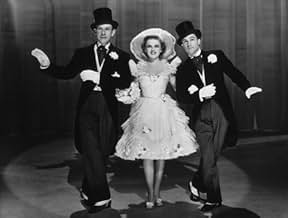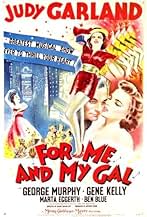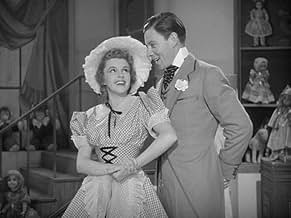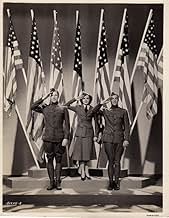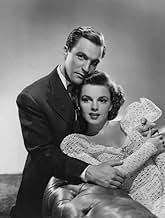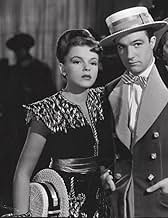CALIFICACIÓN DE IMDb
7.0/10
4.1 k
TU CALIFICACIÓN
Agrega una trama en tu idiomaTwo vaudeville performers fall in love, but find their relationship tested by the arrival of WWI.Two vaudeville performers fall in love, but find their relationship tested by the arrival of WWI.Two vaudeville performers fall in love, but find their relationship tested by the arrival of WWI.
- Dirección
- Guionistas
- Elenco
- Nominado a 1 premio Óscar
- 4 premios ganados y 1 nominación en total
Mártha Eggerth
- Eve Minard
- (as Marta Eggerth)
Stephen McNally
- Mr. Waring
- (as Horace McNally)
Ernie Alexander
- Theater Workman with Big Die
- (sin créditos)
Hooper Atchley
- Assistant Stage Manager
- (sin créditos)
Walter Baldwin
- Bill
- (sin créditos)
Gurney Bell
- Member - Sportsmen Quartet
- (sin créditos)
John Breen
- Soldier
- (sin créditos)
Ken Darby
- Member - The King's Men
- (sin créditos)
George Davis
- France Taxi Driver
- (sin créditos)
Bill Days
- Member - Sportsmen Quartet
- (sin créditos)
John Dilson
- Lou
- (sin créditos)
Jon Dodson
- Member - The King's Men
- (sin créditos)
Lester Dorr
- Stage Manager
- (sin créditos)
Ruth Dwyer
- Nurse
- (sin créditos)
Opiniones destacadas
The classic plot of girl refuses guy only to fall in love with him later is at work again. When the girl happens to be Judy Garland, one of the top box office draws and the MGM triple threat of extraordinarily talented singer, actress and dancer, it kind of changes the whole perspective. In the MGM heavens there are no leading men who can match her on screen stature.
To solve that problem, she gets two leading men. Before World War 1, the vaudeville girl has to choose between two partners. George Murphy and Gene Kelly. Fresh from Broadway success with "Pal Joey", Mr Kelly makes his movie debut in "For Me and My Gal" and it is nothing short of memorable. It was time the world saw that Hollywood dancers wore something other than white tails and top hat, like Mr Astaire.
The screenplay is slight. It hardly matters, because World War 1 is enough of a threat to forward the story anyway. All elements of drama and tear jerking romance are there. For a routine musical at MGM, we expect our happy 40s story, all complete with happy ending, plus the usual congenial mix of complications along the way. And with direction from Busby Berkley, great 1915s songs and two of the greatest musical stars in the mix, we certainly get our happy ending.
Today it stands out because of its musical quality and excellent conception of production. They certainly don't make 'em like this anymore.
Rating: 8/10
To solve that problem, she gets two leading men. Before World War 1, the vaudeville girl has to choose between two partners. George Murphy and Gene Kelly. Fresh from Broadway success with "Pal Joey", Mr Kelly makes his movie debut in "For Me and My Gal" and it is nothing short of memorable. It was time the world saw that Hollywood dancers wore something other than white tails and top hat, like Mr Astaire.
The screenplay is slight. It hardly matters, because World War 1 is enough of a threat to forward the story anyway. All elements of drama and tear jerking romance are there. For a routine musical at MGM, we expect our happy 40s story, all complete with happy ending, plus the usual congenial mix of complications along the way. And with direction from Busby Berkley, great 1915s songs and two of the greatest musical stars in the mix, we certainly get our happy ending.
Today it stands out because of its musical quality and excellent conception of production. They certainly don't make 'em like this anymore.
Rating: 8/10
I thought Judy Garland gave an Oscar worthy performance in this movie. As for Gene Kelly, it was hard to believe that this was his movie debut, his acting made it seem as if he'd been around Hollywood for years. And oh, that musical score, remeniscent of some film scores by Irving Berlin. Not just your ordinary musical, this one has a fine story that fits in with the time of World War One. The title song as done by Garland & Kelly is a classical show-stopper. For sentimentalists, like my wife and I, there are a few scenes that tug at the heart strings, and provide for some misty eyes.
Gene Kelly makes his film debut opposite Judy Garland in this film about vaudeville acts trying to make it big and falling in love too. They start off as partners in a vaudeville act but of course, they fall in love. The story takes place on the verge of American involvement in World War I. Judy's Jo Hayden is an aspiring singer who helps her kid brother study at medical school. When the war breaks out in Europe, he enlists. Just as things were getting good with a marriage and performing at the infamous Palace Theatre in New York City, bad news occurs which separates these two star-crossed lovers. World War I becomes a top priority as does cheering the spirits of the men who go off to battle. The songs and dance numbers are what makes the film. The story is weak but Garland and Kelly's acting talents bring it alive to the audience. The dance and singing sequences are worth watching for any Judy Garland fan. Supporting cast is first rate.
Though a thinly veiled piece of propaganda for WWII sentiment, it did the trick. I couldn't believe I cried not once but three times at this Kelly/Garland musical. An amusement park of a flick. With rollercoaster rides of joy, mood swings of sadness and insecurities, all rolled into a sappy feel good post-depression fluff. Who needs hormones when you can watch this. Great star vehicle for Kelly,it catapulted him into the rarified air of those who have talent, good looks, and that certain "something". Though at times he seems a bit in awe of his surroundings, it comes off as cockiness and works. Garland's sense of innocent security grounded this film and proved she was already in the stratosphere. The supporting cast held up their ends admirably. Enough to make this film enjoyable even in these jaded times.
How both stars must have rolled their eyes when they read this screenplay. The volume of clichés is atrocious: The oversentimental celebration of vaudeville; the romantic triangle; the heel gaining a conscience; the splitting-up-the-act intrigue; the brother and his fate; lines like "you'll never be ready for the big time, because you're small-time in your heart" (Judy nevertheless makes it work). Yet it's a pleasure to view, because Judy and Gene really bring out something special in each other. They did again in "Summer Stock"; in "The Pirate," to my eyes, not so much. She has a gravity and sincerity that balance his self-adoration and schtick, and he was always more persuasive playing a guy of questionable moral values than a mensch. You have to put up with George Murphy at his dullest and Ben Blue at his unfunniest, and Marta Eggerth, as accomplished as she is, appears to be in the wrong movie--she should be doing a Joe Pasternak operetta, not an Arthur Freed extravaganza. But when the two leads sing or dance (she was, in the Forties, a better dancer than she was ever given credit for) or, surprisingly, act together, they're tremendously moving. At her best, which she wasn't always but is here, Judy was the best there was. My favorite moment: the ending of "After You've Gone." Rather than smothering her performance in applause and cutting to a shot of an appreciative audience, Berkeley just fades out. It's MGM's way of saying: Enjoy it, folks, this is as good as it gets.
¿Sabías que…?
- TriviaGene Kelly's film debut. It is known that Judy Garland got him the job after seeing him in the Broadway musical "Pal Joey". Kelly made films in a variety of genres over the next few years but became best known for his energetic dancing style in MGM hits such as Leven anclas (1945), Un día en Nueva York (1949), and Un Americano en París (1951). Kelly, who was a choreographer and director as well as a dancer and singer, received a special Academy Award in 1951 in recognition of his outstanding achievement as an actor, dancer, singer and director. He also received a Life Achievement Award from the American Film Institute in 1985. The song "For Me and My Gal" became one of Kelly's signature songs.
- ErroresJo's YWCA uniform (like much of her clothing in the latter half of the film) is characteristic of World War II, when the film was released, and not World War I, in which it is set. Her uniform's shoulders are too broad and the skirt too short, and she is wearing sheer stockings and pumps instead of opaque stockings and high boots or oxfords.
- Citas
Harry Palmer: Why didn't you tell me I was in love with you?
- Créditos curiososA picture of an infantry soldier in New York harbor and the text "America needs your money. Buy war bonds and stamps at this theatre."
- Versiones alternativasThere is a 1993 colorized version of the film that aired on TNT
- ConexionesEdited into American Masters: Gene Kelly: Anatomy of a Dancer (2002)
- Bandas sonorasFor Me and My Gal
(1917) (uncredited)
Music by George W. Meyer
Lyrics by Edgar Leslie and E. Ray Goetz
Played during the opening credits and often as background music
Played on piano (with background orchestra) by Judy Garland (uncredited) and sung and danced by her and Gene Kelly (uncredited)in a coffee shop
Reprised by Judy Garland (uncredited), Gene Kelly (uncredited) and chorus at the end
Selecciones populares
Inicia sesión para calificar y agrega a la lista de videos para obtener recomendaciones personalizadas
- How long is For Me and My Gal?Con tecnología de Alexa
Detalles
- Fecha de lanzamiento
- País de origen
- Idiomas
- También se conoce como
- For Me and My Gal
- Locaciones de filmación
- Productora
- Ver más créditos de la compañía en IMDbPro
Taquilla
- Presupuesto
- USD 802,000 (estimado)
- Tiempo de ejecución
- 1h 44min(104 min)
- Color
- Relación de aspecto
- 1.37 : 1
Contribuir a esta página
Sugiere una edición o agrega el contenido que falta



